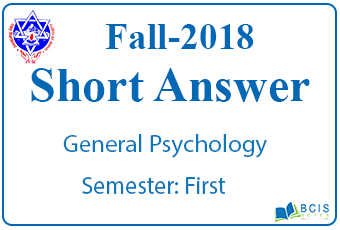
Very Short Questions Fall 2018
The answers to the Very Short Questions Fall 2018 are given below:
1. Define a single unit method of psychology.
ANS- Single-unit recording refers to the use of an electrode to record the electrophysiological activity (action potentials) from a single neuron. An electrode introduced into the brain of a living animal will detect electrical activity that is generated by the neurons adjacent to the electrode tip.
2. List out the different perspectives of psychology.
ANS- The different perspectives of psychology are given below:
- The Psychodynamic Perspective
- The Behavioral Perspective
- The Humanist Perspective
- The Biological Perspective
- The Cognitive Perspective
3. Write about synapse.
ANS- A synapse happens when the electrical activity in the pre-synaptic neuron influences the post-synaptic neuron. There are two types of synapses in the body, the electrical (gap junctions) and chemical. Electrical synapses occur in pre and postsynaptic neurons that are joined via gap junctions.
4. What is the process of perception?
ANS- Perception is a process by which people regard, analyze, retrieve and react to any kind of information from the environment. For example, some people feel happy about earning money while others feel happy about spending money.
5. Clearly define a reinforcement.
ANS- In behavioural psychology, reinforcement is a consequence applied that will strengthen an organism’s future behaviour whenever that behaviour is preceded by a specific antecedent stimulus.
6. Differentiate between concept and prototype.
ANS- Concept is an understanding retained in the mind, from experience, reasoning and/or imagination; a generalization (generic, basic form), or abstraction (mental impression), of a particular set of instances or occurrences (specific, though different, recorded manifestations of the concept) while the prototype is an original object or form which is a basis for other objects, forms, or for its models and generalizations.
7. How do you know the individual is mentally retarded?
ANS- People with mild mental retardation may have impaired motor skills. It may be easiest to understand the differences between mild, moderate, and severe retardation by considering intelligence quotients (IQs) of each. A severely mentally retarded individual might have an IQ that is between 20 and 35.
8. Why sex is called a survival motive?
ANS- Unlike hunger and thirst, sex is not essential for the survival of the individual but is necessary for the survival of the species. Maternal behaviour is instinctive in nature. It is unlearned. Physiological drive causes maternal behaviour.
9. State stress with its types.
ANS- Stress, either physiological, biological, or psychological is an organism’s response to a stressor such as an environmental condition. Stress is the body’s method of reacting to a condition such as a threat, challenge or physical and psychological barrier. According to the American Psychological Association, the three types of stress — acute stress, episodic acute stress, and chronic stress —can all make us feel out of sorts or even ill, but chronic stress is often ignored.
10. Describe the term Id, ego and superego.
ANS- The Id is the instinctual component of personality that is present at birth, and is the source of bodily needs and wants, emotional impulses and desires, especially aggression and the libido. The ego acts according to the reality principle; i.e., it seeks to please the id’s drive in realistic ways that, in the long term, bring benefit, rather than grief. The super-ego reflects the internalization of cultural rules, mainly taught by parents applying their guidance and influence.
You may also like Pokhara University || Fall,2018 || General Psychology

Leave a Reply